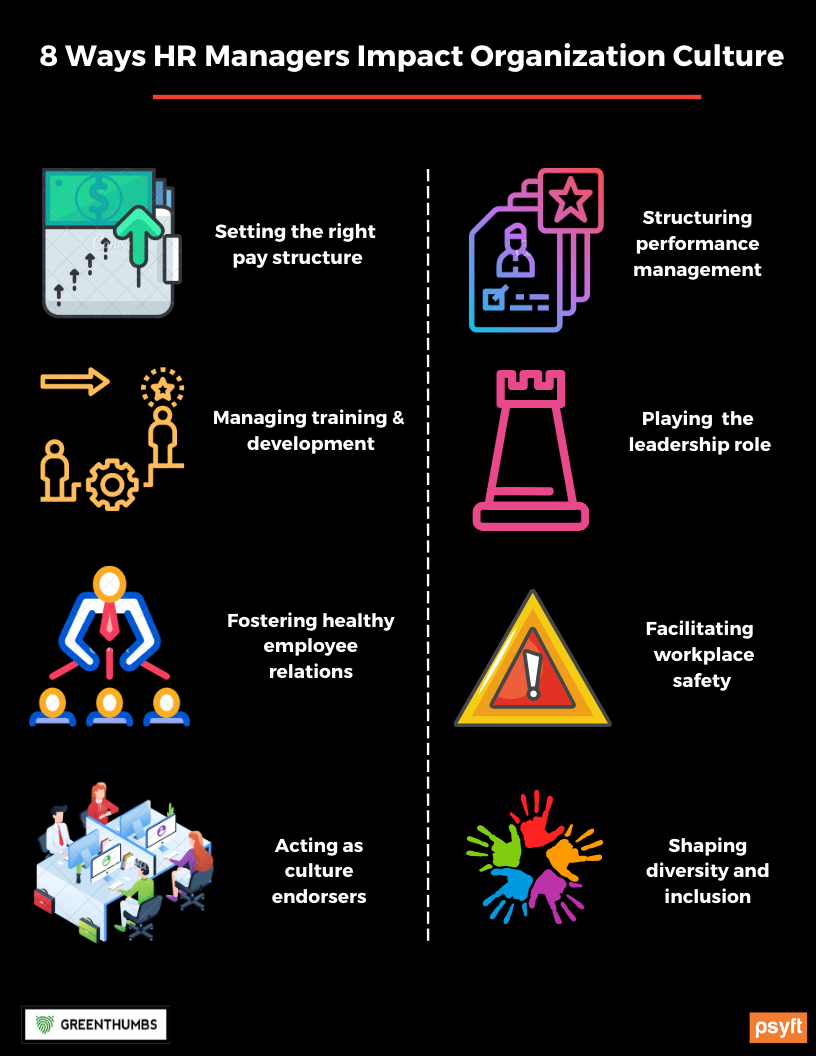Blogs
Your source to the latest insights on what's trending in the HR arena - Recruitment, Talent Assessments, Employee Surveys and Training.

8 ways HR managers impact organization culture
Organization culture is an intangible yet crucial ecosystem that defines the success of any business. Organizational culture refers to the underlying value system, attitude, behavior and goals that lay the very foundation of an organization, its management, its practices, its services, etc. It’s that invisible powerful force that drives the thoughts, decisions, actions and performance of employees.
Strong company culture gets you a competitive edge –
- Companies with strong cultures saw a 4x increase in revenue growth (Forbes).
- Being named a Best Place to Work is associated with a .75% stock jump (Glassdoor).
- 82% of respondents believe that culture is a potential competitive advantage (Deloitte).
HR managers lead all people related initiatives in an organization - recruiting,onboarding, appraisals, L&D and exit programs. They are the ones in direct contact with the employees of a company and have access to all major aspects of work. Therefore, HR leaders play a very s role in building, shaping and reinforcing a company’s value system – a company’s culture.
How do HR managers impact organization culture?
A healthy company culture can have a major effect on the employee morale, on employee performance, productivity and retention. HR managers help organizations to draft and finalize the company framework– payroll, leave, holiday calendar, labor framework, SOPs and much more; thus laying down the very basis of a company’s working culture.
Following are some of the ways in which human resource managers influence and even define the culture of an organization.1. Setting the right pay structure
Salary is one of the primary drivers when it comes to employee engagement and maintaining a progressive company culture. The HR department has a key role to play in laying down pay structures for employees across all levels. The poorly drafted, ambiguous, compensation policy that has no valid connection with the qualifications and skills of company professionals is definitely a deterrent to a sound working environment.
A competitive, clear and well-designed compensation structure helps keep the current workforce happy & attract and retain highly skilled and competent professionals. It helps a company’s workforce stay motivated and dedicated towards performing better. Additionally, such a pay structure positively impacts the interpersonal relationships, behavior and work attitude of employees within the company – all leading to a healthy work culture.
2. Structuring performance management
Performance management is about creating a work environment in which people are enabled to perform to the best of their abilities. Right from recruitment plans to interviews to employee orientation, to running performance reviews at work, etc. all fall under the broader ambit of performance management. It’s a crucial aspect which impacts the business success of any organization.
Like compensation, a fair performance management system ensures an employee’s assimilation to the company and further strengthens corporate culture. An HR manager is the linchpin of a successful performance management process.
If HR Managers foster structured performance management, it leads to employees working smarter, harder, and together to achieve organizational goals, considering themselves a part of the organization as a whole. A proper performance management system lays emphasis on creating a collaborative and co-operative environment.
3. Managing training and development
By launching different training & development programs, HR managers help build and sustain an ever-growing and ever-dynamic business culture.
Be it workshops on skill advancement, technical know-how or programs that focus on some of the softer elements like – work personality, employee behavior, relationship building, interaction & communication, team management, training and development initiatives form the basis of defining the work culture an organization represents. Laying emphasis on relevant learning and development initiatives and aligning them with company values is an objective that HR managers help achieve.
4. Playing the leadership role
HR managers are among the most influential workplace leaders (given the working relationship and the rapport they share with employees). The human resource department delegates responsibilities, sets job framework and guidelines and supervises performance and behavior. Thus, the conduct of HR leaders - how they interact with and manage employees and their concerns can either have a negative or positive impact on the employee morale, productivity and engagement.
For example, if HR managers support constructive give and take of feedback and open talks with teams, it will help build a congenial work culture, encouraging workplace camaraderie and affinity.
5. Fostering healthy employee relations
Like a bridge, HR managers work towards bringing the employees and management in a company closer. HR managers, through all their roles, responsibilities and initiatives, reflect upon the culture of an organization – how a company functions, what vision does it represent, what value system it is based on.
For instance, proactively addressing & resolving workplace problems, encouraging transparent and honest communication between leadership and employees are ways in which HR managers positively impact a company’s organizational culture.
6. Facilitating workplace safety
How capable an organization is in facilitating a safe, hazard-free work environment for its employees also says a lot about its work culture.
To make employees aware of the safety measures that are in place, impart training to handle incidents, injuries, and lay down concrete workplace safety policies ensuring employee safety and well-being etc. is yet another essential exercise managed by the HR managers.
7. Acting as culture endorsers
HR managers play the role of active organization culture consultants and endorsers, by -
Assessing and understanding the work culture. Having a sound knowledge of company strategy. Identifying areas of focus for their company. Attracting and retaining the right talent. Aligning employees with the company culture Developing a strategic culture plan that brings the organization's values and goals and its employees together.
8. Shaping diversity and inclusion
Diversity and inclusion are factors that are shaping every organizations’ future success. Workplace diversity is an imperative to greater employee competence, healthier work culture, elevated employee engagement and less office politics. Companies that encourage a more diverse culture tend to outperform their industry peers.
In all the responsibilities they carry out - hiring policies, selection and shortlisting, performance reviews, grievance redressal, employee welfare etc; HR managers represent how inclusive and diverse a workplace is.
In the end
A sound company culture is the key to favorable business outcomes and managing your people and their affairs has a significant effect on evaluating and nurturing this very company culture.
A healthy organization culture goes a long way in fostering high performance, productivity and business profits. It is the responsibility of human resources managers to help shape an organization’s culture and make it future sustainable.
FAQs
1 : What is organizational culture, and why is it important for businesses?
Answer : Organizational culture encompasses the values, attitudes, behaviors, and goals that shape an organization. It's essential for businesses as it influences employee morale, performance, productivity, and retention, ultimately impacting the company's success.
2 : What role do HR managers play in shaping organizational culture?
Answer : HR managers are pivotal in building, shaping, and reinforcing a company's culture. They oversee various people-related initiatives such as recruiting, onboarding, performance appraisals, learning and development, and exit programs, which directly impact an organization's culture.
3 : How does HR influence the pay structure, and why is it significant?
Answer : HR managers play a crucial role in designing fair and competitive pay structures. A well-structured compensation system boosts employee morale, attracts and retains skilled professionals, and fosters a positive work environment, contributing to a healthy organizational culture.
4 : What is the relationship between HR and performance management?
Answer : HR managers are central to effective performance management, from recruitment to conducting performance reviews. A well-implemented performance management system encourages collaboration, aligns employees with organizational goals, and contributes to a cooperative work culture.
5 : How do HR managers contribute to workplace safety and culture?
Answer : HR managers facilitate workplace safety by providing training, creating safety policies, and ensuring employee well-being. A safe work environment reflects positively on an organization's culture, showcasing its commitment to employee welfare.
6 : What is the HR manager's role in fostering diversity and inclusion?
Answer : HR managers shape workplace diversity and inclusion through hiring policies, selection processes, grievance redressal, and employee welfare. Embracing diversity leads to a more competent and inclusive work culture, improving overall organizational success.
7 : Why are HR managers considered organizational culture endorsers?
Answer : HR managers assess and understand an organization's culture, align it with company strategy, attract the right talent, and develop a strategic culture plan. They actively endorse and consult on organizational culture, making it integral to the company's values and goals.
8 : How does a healthy organizational culture impact business outcome?
Answer : A robust organizational culture fosters high performance, productivity, and profitability. HR managers are responsible for nurturing and sustaining such a culture, ensuring its future sustainability and contributing to business success.
Recent Articles
News Center


- India Today - 7 reasons companies ask for psychometric tests
- Business World - AI - The New Secret Sauce in Psychometric Assessments
- DNA - HR Trends for 2018
- The Hindu - Psychometric Assessment a "game changer" in hiring
- Entrepreneur - 9 ways to promote actionable feedback at organisations
- Human Capital - Looking Beyond Performance Appraisals
Top Trending Pages
- Best Employee Engagement Survey Company
- Executive Search | Online Assessments & Surveys
- Top Personality Assessment Providers in India
- Talent Search | HR Consulting | Recruitment
- Manager Effectiveness Survey
- What is Training Needs Analysis (TNA)? - Meaning & Benefits
- GreenThumbs: One of the Best Executive Search Firms in India
- Know Your Employee Net Promoter Score
- Employee Onboarding Survey
- 360 Degree Feedback | FAQs
